高中英语导学案与练习学案:Unit 4 Earthquakes-grammar(新人教版必修1)
- 格式:doc
- 大小:126.50 KB
- 文档页数:6
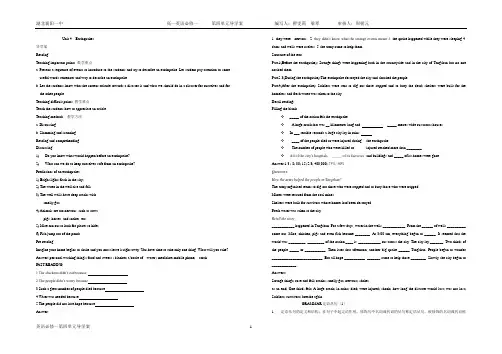
Unit 4 Earthquakes导学案ReadingTeaching important points 教学重点a. Present a sequence of events to introduce to the students and try to describe an earthquake. Let student pay attention to some usef ul words sentences and way to describe an earthquake.b. Let the students know what the correct attitude towards a disaster is and what we should do in a disaster f or ourselves and f or the other people.Teaching diff i cult points 教学难点Teach the students how to appreciate an article.Teaching methods 教学方法a. Discussingb. Skimming and scanningReading and comprehendingDiscussing1)Do you know what would happen bef ore an earthquake?2)What can we do to keep ourselves saf e f rom an earthquake?Predictions of an earthquake:1) Bright lights f lash in the sky;2) The water in the well rise and f all;3) The well walls have deep cracks withsmelly gas;4) Animals are too nervous, such as cows,pigs, horses, and snakes, etc5) Mice run out to look f or places to hide;6) Fish jump out of the ponds.Pre-readingImagine your home begins to shake and you must leave it right away. Y ou have time to take only one thing. What will you take? Answer: personal washing things; f ood and sweets ; blanket; a bottle of water ; medicine; mobile phone; torchFAST READING1 The chickens didn’t eat because2 The people didn’t worry because3 Such a great number of people died because4 Water was needed because5 The people did not lose hope becauseAnswer: 1. they were nervous 2. they didn’t know what the strange events meant 3. the quake happened while they were sleeping 4. dams and wells were useless. 5. the army came to help them.Structure of the textPara1(Before the earthquake): Strange things were happening both in the countryside and in the city of Tangshan but no one noticed them.Para2-3(During the earthquake):The earthquake destoryed the city and shocked the people.Para4(Af t er the earthquake): Soldiers were sent to dig out those trapped and to bury the dead; shelters were built f or the homeless and f resh water was taken to the city.Detail reading:Filling the blank_____ of the nation f elt the earthquake.A huge crack that was __ kilometres long and _____ metres wide cut across houses.In ___ terrible seconds a large city lay in ruins.____ of the people died or were injured during the earthquake.The number of people who were killed or injured reached more than ________.All of the city’s hospitals, _____ of its f actories and buildings and _____ of its homes were gone.Answer:1/3 ; 8; 30; 15; 2/3; 400,000;75%; 90%Questions:How the army helped the people in Tangshan?The army organized teams to dig out those who were trapped and to bury those who were trapped.Miners were rescued from the coal mines.Shelters were built f or survivors whose homes had been destroyedFresh water was taken to the city.Retell the story____________ happened in Tangshan. For a f ew days, water in the wells ____________. From the ______ of wells __________ come out. Mice, chicken, pigs and even f ish became ________. At 3:00 am, everything began to ______. It seemed that the world was _________. _________ of the nation ____ it. ____________ cut across the city. The city lay _______. Two-thirds of the people _____ or ___________. Then later that af t ernoon, another big quake ______ Tangshan. People began to wonder ___________________________. But all hope ___________. _______ came to help those ________. Slowly, the city began to _____________.Answers:Strange things; rose and f ell; cracks; smelly gas; nervous; shake;at an end; One-third; f elt; A huge crack; in ruins; died; were injured; shook; how long the disaster would last; was not lost; Soldiers; survivors; breathe againGRAMMA R定语从句(1)1.定语从句的定义和结构:在句子中起定语作用,修饰句中名词或代词的从句称定语从句,被修饰的名词或代词称为先行词。
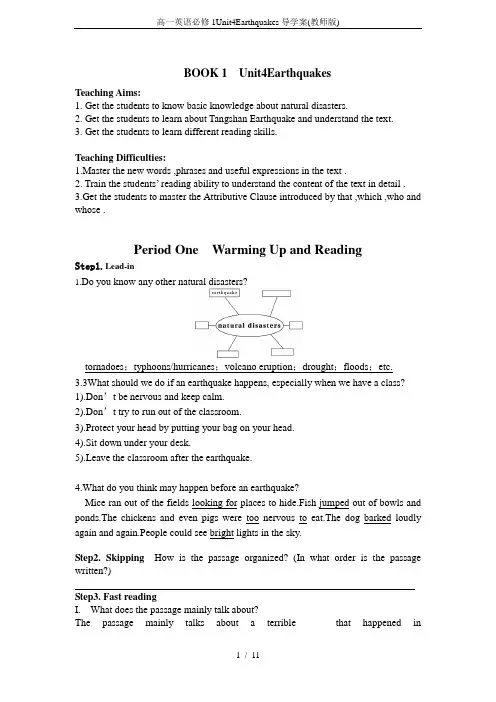
BOOK 1 Unit4EarthquakesTeaching Aims:1. Get the students to know basic knowledge about natural disasters.2. Get the students to learn about Tangshan Earthquake and understand the text.3. Get the students to learn different reading skills.Teaching Difficulties:1.Master the new words ,phrases and useful expressions in the text .2. Train the students’ reading ability to understand the content of the text in detail .3.Get the students to master the Attributive Clause introduced by that ,which ,who and whose .Period One Warming Up and ReadingStep1.Lead-in1.Do you know any other natural disasters?tornadoes;typhoons/hurricanes;volcano eruption;drought;floods;etc.3.3What should we do if an earthquake happens, especially when we have a class?1).Don’t be nervous and keep calm.2).Don’t try to run out of the classroom.3).Protect your head by putting your bag on your head.4).Sit down under your desk.5).Leave the classroom after the earthquake.4.What do you think may happen before an earthquake?Mice ran out of the fields looking for places to hide.Fish jumped out of bowls and ponds.The chickens and even pigs were too nervous to eat.The dog barked loudly again and again.People could see bright lights in the sky.Step2. Skipping How is the passage organized? (In what order is the passage written?)Step3. Fast readingI. What does the passage mainly talk about?The passage mainly talks about a terrible________that happened in________( where?) in _______( when? ) and caused great damage to people.II. Find out the topic sentence of each paragraph.Para.1 _____________________________________________________________ Para.2 ____________________________________________________________ Para.3 ______________________________________________________________ Para.4 ___________________________________________________________ III. Match the sentences. Divide the passage into three parts and find out the main idea of each part.Part 1 (Para. ) What happened during the quake and thedamage caused by the quake.Part 2 (Para. ) The rescue work after the earthquakePart 3 ( Para. ) Signs before the earthquake.☆点拨:Step 4: Careful readingTask 1:Choose the best answers.参照《状元桥》同步练习册 49页.(阅读理解)Task 2:ScanningRead part 1 in detail and fill in the form to see what happened before thePlease look at the pictures on page 25. These are some signs that can tell us the quake is drawing near. If we can read these signs from nature, it is very useful for s to make good preparations for the coming disaster, though quite often man still can not prevent it.Task 3:Reading part 2, fill in the blanks with numbers to see how serious the earthquake was.(1) of the nation felt the earthquake.(2) In terrible seconds a large city lay in ruins.(3) of the people died or were injured during the earthquake.(4)The number of people who were killed or injured reached morethan .(5)All of the city’s hospitals,of its factories and buildings and of its homes were gone.*What other sentences can express the quake is GREAT?Task 4:Read part 3 to catch what happened after the earthquakes. (Discussion)1)The army_______ teams to_______ those who were trapped and to _______ thedead.2)Miners _______ _______ from the coal mines.3)Shelters _______ for survivors whose homes had been destroyed.4)Fresh water _______ _______ to the city.*How to understand the last sentence“slowly, the city began to breathe again”?A.The trees turned green.B.The city returned to normal gradually.C. The animals began to breathe.D.People who were trapped came to life.Step5. Write a summary of the passage within 30 words.On July 28,1976, the greatest earthquake of the 20th century _______ Tangshan, Hebei Province, ________(从句的引导词) destroyed almost everything. Soon many soldiers __________, _________( bring的非谓语形式) hope for a new life.Section Two Language points学习目标:1. Enable the students to grasp the usages of such important new words and expressions as injure, destroy, burst, rescue, as if, etc.2. Get the students to master the usages of the patterns: “It seemed that the world was at an end” and “All hope was not lost”. etc.Step1. 课文知识点重现根据中文提示完成下列句子。
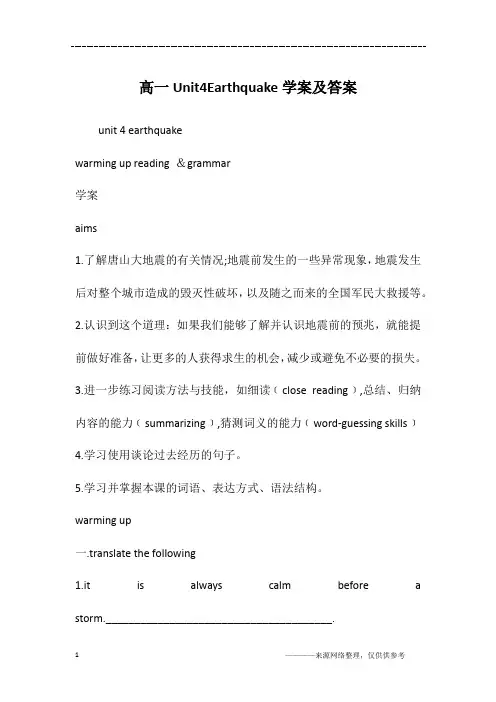
高一Unit4Earthquake学案及答案unit 4 earthquakewarming up reading &grammar学案aims1.了解唐山大地震的有关情况;地震前发生的一些异常现象,地震发生后对整个城市造成的毁灭性破坏,以及随之而来的全国军民大救援等。
2.认识到这个道理:如果我们能够了解并认识地震前的预兆,就能提前做好准备,让更多的人获得求生的机会,减少或避免不必要的损失。
3.进一步练习阅读方法与技能,如细读﹝close reading﹞,总结、归纳内容的能力﹝summarizing﹞,猜测词义的能力﹝word-guessing skills﹞4.学习使用谈论过去经历的句子。
5.学习并掌握本课的词语、表达方式、语法结构。
warming up一.translate the following1.it is always calm before a storm._______________________________________.2.now, imagine there has been a big earthquake._______________________________.这里imagine的意思是____________________.其后可跟名词,代词,动词的ing形式和宾语从句。
例如:我想象不出他长的什么样儿。
_______________________________________.i can hardly imagine two of them______ the enemies.a.defeatb.to defeatc.defeatingd.to have defeated3.describe to your parter what might happen to all the things in the photos.translate:_____________________________________________________.在这里happen to sb/sth的意思是_________________________.例如:你知道大卫昨天晚上发生什么事了吗?__________________________________________?另外,happen to do sth 的意思____________________________ 例如:他来访时,我恰巧出去了。
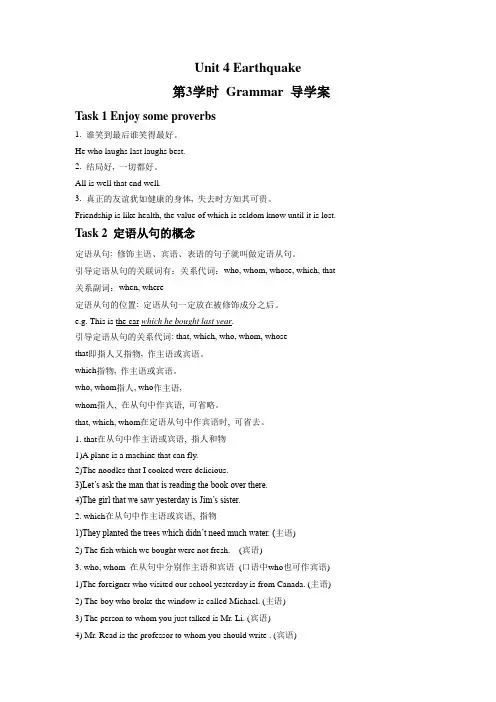
Unit 4 Earthquake第3学时Grammar 导学案Task 1 Enjoy some proverbs1. 谁笑到最后谁笑得最好。
He who laughs last laughs best.2. 结局好, 一切都好。
All is well that end well.3. 真正的友谊犹如健康的身体, 失去时方知其可贵。
Friendship is like health, the value of which is seldom know until it is lost. Task 2 定语从句的概念定语从句: 修饰主语、宾语、表语的句子就叫做定语从句。
引导定语从句的关联词有:关系代词:who, whom, whose, which, that 关系副词:when, where定语从句的位置: 定语从句一定放在被修饰成分之后。
e.g. This is the car which he bought last year.引导定语从句的关系代词: that, which, who, whom, whosethat即指人又指物, 作主语或宾语。
which指物, 作主语或宾语。
who, whom指人, who作主语,whom指人, 在从句中作宾语, 可省略。
that, which, whom在定语从句中作宾语时, 可省去。
1. that在从句中作主语或宾语, 指人和物1)A plane is a machine that can fly.2)The noodles that I cooked were delicious.3)Let’s ask the man that is reading the book over there.4)The girl that we saw yesterday is Jim’s sister.2. which在从句中作主语或宾语, 指物1)They planted the trees which didn’t need much water. (主语)2) The fish which we bought were not fresh. (宾语)3. who, whom 在从句中分别作主语和宾语(口语中who也可作宾语)1)The foreigner who visited our school yesterday is from Canada. (主语)2) The boy who broke the window is called Michael. (主语)3) The person to whom you just talked is Mr. Li. (宾语)4) Mr. Read is the professor to whom you should write . (宾语)4. whose 在从句中作定语, 指人或物1) Miss Flower is the teacher whose house caught fire last week.2) This is the boy whose composition the teacher talked of .3) This is the book whose cover is blue.特别提示1:that和which在指物的情况下一般都可以互换, 但在下列情况下, 一般用that而不用which(1)先行词为all, everything, nothing, something, anything, little, much 等不定代词时。
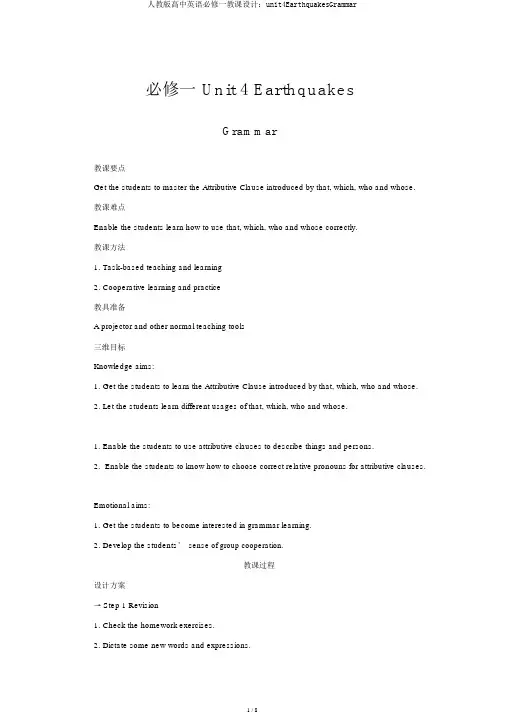
必修一 Unit 4 EarthquakesGrammar教课要点Get the students to master the Attributive Clause introduced by that, which, who and whose.教课难点Enable the students learn how to use that, which, who and whose correctly.教课方法1.Task-based teaching and learning2.Cooperative learning and practice教具准备A projector and other normal teaching tools三维目标Knowledge aims:1.Get the students to learn the Attributive Clause introduced by that, which, who and whose.2.Let the students learn different usages of that, which, who and whose.1.Enable the students to use attributive clauses to describe things and persons.2.Enable the students to know how to choose correct relative pronouns for attributive clauses.Emotional aims:1.Get the students to become interested in grammar learning.2.Develop the students’ sense of group cooperation.教课过程设计方案→Step 1 Revision1.Check the homework exercises.2.Dictate some new words and expressions.3. Translate the sentences:1)并不是全部的竹子都能长高。
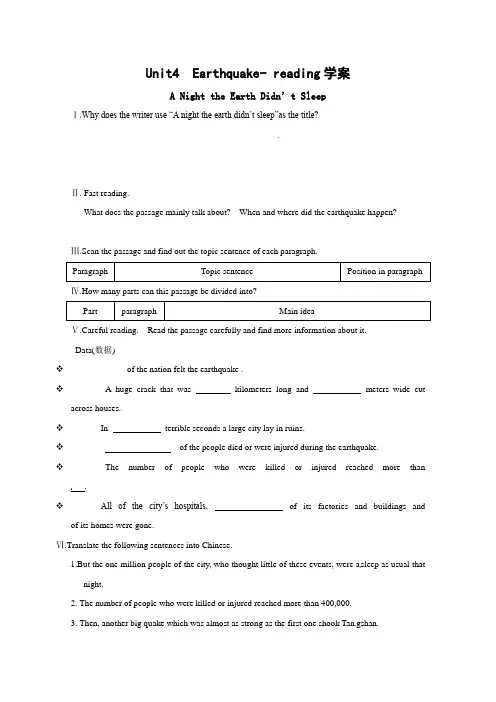
Unit4 Earthquake- reading学案A Night the Earth Didn’t SleepⅠ.Why does the writer use “A night the earth didn’t sleep”as the title?________________________________________________________________________________ ________________________________________________________________________________ ________________________________________________________________________________ Ⅱ. Fast reading.What does the passage mainly talk about? When and where did the earthquake happen?________________________________________________________________________________ Ⅲ.Scan the passage and find out the topic sentence of each paragraph.Ⅳ.How many parts can this passage be divided into?Ⅴ.Careful reading. Read the passage carefully and find more information about it.Data(数据)______of the nation felt the earthquake .A huge crack that was kilometers long and meters wide cutacross houses.In terrible seconds a large city lay in ruins.of the people died or were injured during the earthquake.The number of people who were killed or injured reached more than .All of the city’s hospitals, _ of its factories and buildings and of its homes were gone.Ⅵ.Translate the following sentences into Chinese.1.But the one million people of the city, who thought little of these events, were a sleep as usual thatnight.2. The number of people who were killed or injured reached more than 400,000.3. Then, another big quake which was almost as strong as the first one shook Tan gshan.4. The army organ ized teams to dig out those who were trapped and to bury the dead.Ⅶ.语言点:1.Imagine your home begins to shake and you must leave it right away…imagine:imagine + n. /pron./ G./ cl.imagine sb. to beshake : cause to move to and froright away : at once ; in no time ; immediatelyright now : at this very momentMake up your mind___________.I’ll return the book___________.2.burst : to come open or fly apart suddenlyThe balloon suddenly burst.burst into + n.Some robbers burst into that house.burst outburst out + doing They burst out laughing.burst into+ n. burst out + doing……He burst into laughter. = He burst out laughing He bu rst into tears. = He burst out crying.3 . But the one million people of the city, wh o thought little of these events, went to bed as usualthat night. ( Non- Defining Attributive Clauses )Do you want a friend whom you could tell everything to like your deepest…(Unit 1 )…because those who ruled England at that time spoke French. ( Unit 2 )The plains where rice grows. ( Unit 3 )( Defining Attributive Clause )4.T w o-t h i r d s o f t h e p e o p l e d i e d o r w e r e__injured__d u r i n g t h e e a r t h q u a k e.(1)two-thirds= two thirds More than 61% of the surface of the surface of the earth____covered by water.Seventy percent of the workers in this factory ______young.(2)injure: to hurt oneself/ sb / sth. physicallyCompare: injure/ hurt/wound Their criticisms _________him deeply. have hurtSmoking will _________his health.He was slightly ________in the car accident.He got ___________in the fighting.What you said ________my feeling.5. People began to wonder how long the disaster would last.wonder : v. A. to have a feeling of surprise.B. to be filled with curiosity or doubt.n. one that arouses astonishment, surprise ; admirationIt is no wonder (that )= No wonder (that)---Tom often works deep into the night every day.---No wonder he always gets first in the examinations.6. All hope was not lost.all…not … = not all….: some but not allNot all the children are left. (= Only some of them left early.)Not all the children are noisy.(= Some of the children are not noisy.)& none of …..None of us were allowed to go there.None of these reports is very helpful.1.Find out the difficult sentences in the passage .2.Do exercises on page 27—28. Ex. 1,2 & 3 ( Learning about language)3.Do exercises 1 & 2 on page 63. ( Using words and expres sions)4.Review Attributive Clause5.Imagine your home begins to shake and you must leave it right away. You have time to takeonly one thing. What will you take? Why ?答案A Night the Earth Didn’t SleepⅠ.Why does the writer use “A night the earth didn’t sleep”as the title?Night is the time to sleep, and night should be safe and quiet. But that night everythingchanged. The writer uses it as title to show how terrible and unusual that night was. Ⅱ. Fast reading. An earthquake happened in Tangshan in 1976Ⅲ.Scan the passage and find out the topic sentence of each paragraph.Ⅳ.How many parts can this passage be divided into?Ⅴ.Careful readingRead the passage carefully and find more information about it.Data(数据).1/38 3015 2/3400,00075%90%语言点:1. right nowright away4.is。
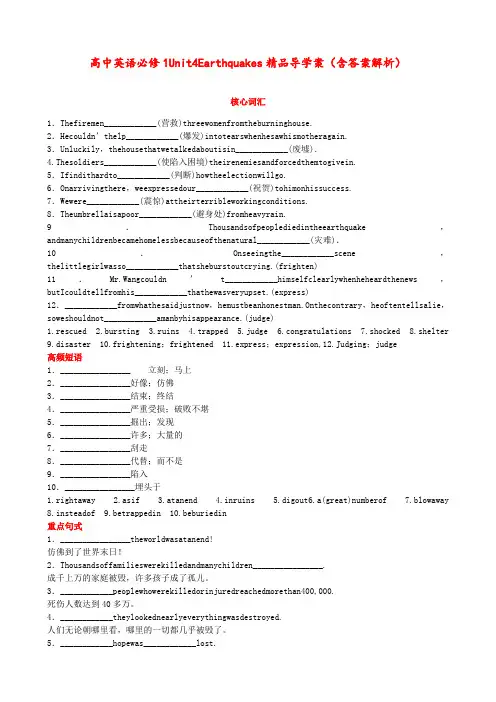
高中英语必修1Unit4Earthquakes精品导学案(含答案解析)核心词汇1.Thefiremen____________(营救)threewomenfromtheburninghouse.2.Hecouldn’thelp____________(爆发)intotearswhenhesawhismotheragain.3.Unluckily,thehousethatwetalkedaboutisin____________(废墟).4.Thesoldiers____________(使陷入困境)theirenemiesandforcedthemtogivein.5.Ifindithardto____________(判断)howtheelectionwillgo.6.Onarrivingthere,weexpressedour____________(祝贺)tohimonhissuccess.7.Wewere____________(震惊)attheirterribleworkingconditions.8.Theumbrellaisapoor____________(避身处)fromheavyrain. 9.Thousandsofpeoplediedintheearthquake,andmanychildrenbecamehomelessbecauseofthenatural____________(灾难).10.Onseeingthe____________scene,thelittlegirlwasso____________thatsheburstoutcrying.(frighten)11.Mr.Wangcouldn’t____________himselfclearlywhenheheardthenews,butIcouldtellfromhis____________thathewasveryupset.(express)12.____________fromwhathesaidjustnow,hemustbeanhonestman.Onthecontrary,heoftentellsalie,soweshouldnot____________amanbyhisappearance.(judge)1.rescued2.bursting3.ruins4.trapped5.judge6.congratulations7.shocked8.shelter9.disaster 10.frightening;frightened 11.express;expression,12.Judging;judge高频短语1.________________ 立刻;马上2.________________好像;仿佛3.________________结束;终结4.________________严重受损;破败不堪5.________________掘出;发现6.________________许多;大量的7.________________刮走8.________________代替;而不是9.________________陷入10.________________埋头于1.rightaway2.asif3.atanend4.inruins5.digout6.a(great)numberof7.blowaway8.insteadof9.betrappedin 10.beburiedin重点句式1.________________theworldwasatanend!仿佛到了世界末日!2.Thousandsoffamilieswerekilledandmanychildren________________.成千上万的家庭被毁,许多孩子成了孤儿。
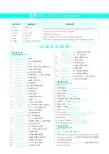
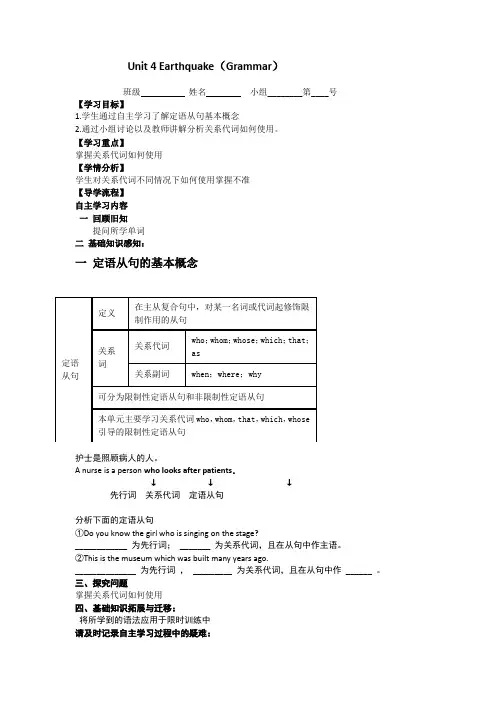
Unit 4 Earthquake(Grammar)班级姓名小组________第____号【学习目标】1.学生通过自主学习了解定语从句基本概念2.通过小组讨论以及教师讲解分析关系代词如何使用。
【学习重点】掌握关系代词如何使用【学情分析】学生对关系代词不同情况下如何使用掌握不准【导学流程】自主学习内容一回顾旧知提问所学单词二基础知识感知:一定语从句的基本概念护士是照顾病人的人。
A nurse is a person who looks after patients.↓↓↓先行词关系代词定语从句分析下面的定语从句①Do you know the girl who is singing on the stage?____________ 为先行词;_______ 为关系代词,且在从句中作主语。
②This is the museum which was built many years ago.______________ 为先行词,_________ 为关系代词,且在从句中作______ 。
三、探究问题掌握关系代词如何使用四、基础知识拓展与迁移:将所学到的语法应用于限时训练中请及时记录自主学习过程中的疑难:小组讨论问题预设:二关系代词的使用1、由关系代词引导的定语从句以及充当的成分关系代词指代先行词,在定语从句中充当主语、宾语、定语等,因此定语从句中不能再出现关系代词所指代的名词或代词。
①Do you know the man _____/_____ was injured in theaccident?(关系代词作主语)②The boy_____/ _____ we just saw in the library is the monitor of Class Three(关系代词作宾语,可省略)③Excuse me, are you the gentleman whose umbrella/the umbrella of whom I borrowed yesterday?(关系代词作定语)④Mary is driving a car which/ that can travel 160 kilometres an hour. (关系代词作主语)⑤He has not found the mobile phone____/_____he lost last week.(关系代词作宾语,可省略2关系代词只用that而不用which的情况①当先行词为all,everything,nothing,anything,little,much等不定代词或先行词被这些词修饰时,关系代词通常用thatAll _____ can be done has been done.②当先行词是序数词、形容词最高级或先行词被序数词或形容词最高级修饰时,关系代词通常用thatThis is the most beautiful park______ I have visited.③当先行词被the only, the very,the last修饰时。
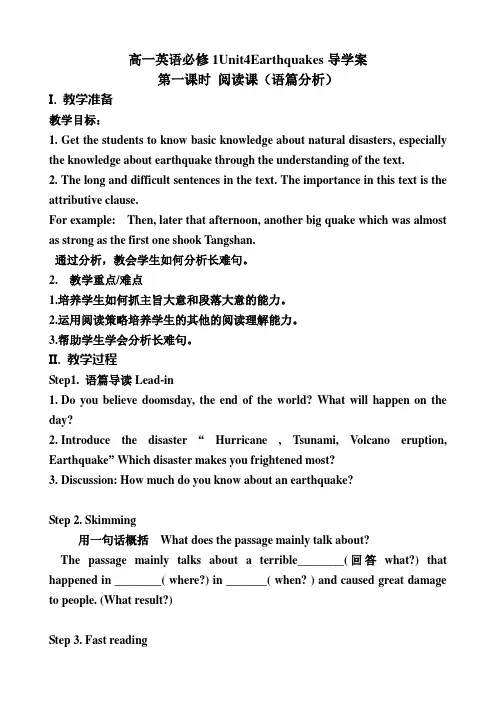
高一英语必修1Unit4Earthquakes导学案第一课时阅读课(语篇分析)I. 教学准备教学目标:1. Get the students to know basic knowledge about natural disasters, especially the knowledge about earthquake through the understanding of the text.2. The long and difficult sentences in the text. The importance in this text is the attributive clause.For example: Then, later that afternoon, another big quake which was almost as strong as the first one shook Tangshan.通过分析,教会学生如何分析长难句。
2. 教学重点/难点1.培养学生如何抓主旨大意和段落大意的能力。
2.运用阅读策略培养学生的其他的阅读理解能力。
3.帮助学生学会分析长难句。
II. 教学过程Step1. 语篇导读Lead-in1.Do you believe doomsday, the end of the world? What will happen on the day?2.Introduce the disaster “Hurricane , Tsunami, Volcano eruption, Earthquake” Which disaster makes you frightened most?3.Discussion: How much do you know about an earthquake?Step 2. Skimming用一句话概括What does the passage mainly talk about?The passage mainly talks about a terrible________(回答what?) that happened in ________( where?) in _______( when? ) and caused great damage to people. (What result?)Step 3. Fast reading1. Read the passage quickly and try to match(匹配) each paragraph with its main idea. Pay attention to (注意) the first and second sentences of each paragraph.Para 1 The earthquake destroyed the city of Tangshan.Para 2 The army came to help the survivors, bringing hope for a new life. Para 3 Before the earthquake strange things began to happen, but no one paid attention to them.Para.4 The people were very shocked at the destruction.2. We can divide the four paragraphs into three parts, match it with its main ideaPart 1 (Para.1 ) damage during the earthquakePart 2 ( ) The rescue work after the earthquake Part 3 ( ) Signs before the earthquake.☆点拨:Structure of the whole passageStep 4 Details of each partPart 1 Before the earthquake*the water ________________________________________________ *the well walls _______________________________________________ *chickens & pigs _______________________________________________ *mice ________________________________________________ *the water pipes ________________________________________________ *people ________________________________________________ Part 2I.II..Data ( 数据)(1)_______ of the nation felt the earthquake.(2)A huge crack that was kilometres long and metres wide cut across houses.(3)In terrible seconds a large city lay in ruins.(4) of the people died or were injured during the earthquake.(5) The number of people who were killed or injured reached more than .(6)All of the city’s hospitals, of its factories and buildings and of its homes were gone.Part 3 What happened after the earthquake1)The sent 150,000 soldiers to Tangshan, and organized teams to dig out those who were trapped and to bury the dead.2)Workers built for survivors whose homes had been destroyed.3)Result: The city began to again.Step 4 Sentences1. 原句:“A huge crack that was eight kilometers long and thirty metres wide cut across houses, roads and canals.”分析:这是一个____________(简单句/ 并列句/主从复合句),该主句的主语为____________,谓语为_________, cut across在这里意为: “径直穿过”, 中间跟一个由that引导的________从句:“that was eight kilometers long and thirty metres wide”, that 在从句中充当______, 修饰的先行词为___________ .翻译:_____________________________________________________________。
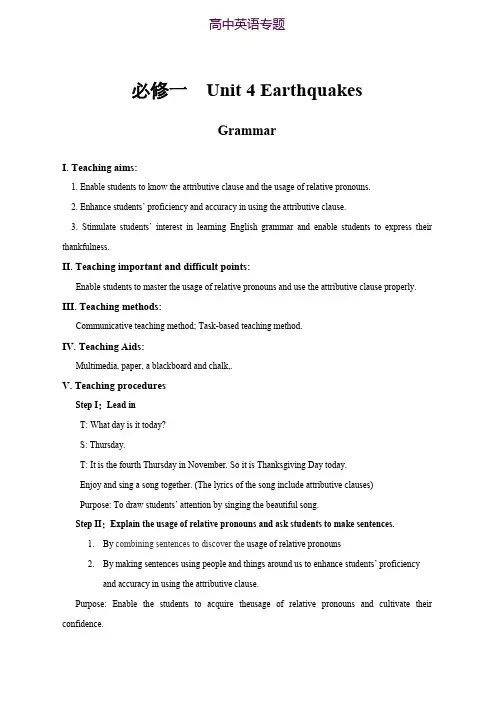
必修一Unit 4 EarthquakesGrammarI. Teaching aims:1. Enable students to know the attributive clause and the usage of relative pronouns.2. Enhance stude nts’ p roficiency and accuracy in using the attributive clause.3. Stimulate students’ interest in learni ng English grammar and enable students to express their thankfulness.II. Teaching important and difficult points:Enable students to master the usage of relative pronouns and use the attributive clause properly. III. Teaching methods:Communicative teaching method; Task-based teaching method.IV. Teaching Aids:Multimedia, paper, a blackboard and chalk,.V. Teaching proceduresStep I:Lead inT: What day is it today?S: Thursday.T: It is the fourth Thursday in November. So it is Thanksgiving Day today.Enjoy and sing a song together. (The lyrics of the song include attributive clauses)Purpose: To draw students’ attention by singing the beautiful song.Step II:Explain the usage of relative pronouns and ask students to make sentences.1.By combining sentences to discover the usage of relative pronouns2.By making sentences using people and things around us to enhance students’ proficiencyand accuracy in using the attributive clause.Purpose: Enable the students to acquire theusage of relative pronouns and cultivate their confidence.Step III:Exercises (Competition between boys and girls)Six kinds of exercises:Correct; Speak and guess; Listen and count; Translate; Choose; Make sentencesPurpose: Through various exercises to enable students to have a command of what they have learned.Step IV:Make a card (Group work)Make a card for the person who you are grateful to on this special day.Purpose: Cultivate st udents’ cooperative ability and learn to write using the attributive clause.Step V:Fill in the blanks and conclude the cases where only “that” can be used.Then raise a question Do you know the cases where only “which” can be used.Purpose: Enable stu dents to understand “Knowledge is endless” and the necessity of keep on learning.StepⅥ: SummaryAsk students to look at the blackboard and sum up what they have learned.StepⅦ: HomeworkWrite a letter to the person who you are grateful to.Purpose: Writing is one of the most important skills. Through writing, students can have a good command of relative pronouns and the attributive clause.Blackboard designThe Attributive ClauseRelative pronouns: who, whom, which, that, whose(Ask students to fill in the blanks)that: 1. everything 2. the best 3. the first 4. the only5. people & things6. who & which。
Unit4 EarthquakesGrammar关系代词的用法学习目标:1.在本节课结束后学生能够清楚定语从句的意义,引导词与构成形式及引导词的特殊用法。
2.在本节课结束后学生能够初步掌握并运用由关系代词that,which,who引导的定语从句。
课前自主预习:定语是用来修饰、限定、说明名词或代词的品质与特征的。
主要有形容词此外还有名词、代词、数词、介词短语、动词不定式(短语)、分词、定语从句或相当于形容词的词、短语或句子都可以作定语。
汉语中常用‘……的’表示。
定语从句:修饰某一名词或代词的从句叫定语从句,它实际上起了形容词的作用。
定语从句一般紧跟在它所修饰的先行词之后。
先行词:被定语从句修饰的词叫先行词。
关系词:引导定语从句的词叫关系词。
分为关系代词和关系副词。
定语从句可以分为限制性定语从句和非限制性定语从句。
限制性定语从句:从句与主句关系密切,去掉从句,主句意义不完整,甚至不合逻辑。
非限制性定语从句:从句是对主句的进一步说明,通常和主句间用逗号隔开,将从句拿掉后其他部分仍可成立。
课堂展示:一.关系代词的用法1.who的用法Who指认,在从句中作主语。
关系代词在从句中作主语时,从句的谓语动词用单数还是复数应由先行词决定。
Yesterday I helped an old man who lost his way.Nothing is difficult for the man who will try.(世上无难事,只要肯攀登)例题点睛:Women ______ drink more than two cups of coffee a day have a greater chance of having heart disease than those _____ don't. A. who; / B. /; who C. who; who D. /; / 注意:当先行词是one of +名词复数时,从句谓语动词用复数,当先行词是the (only) one of +名词复数作主语时谓语动词用单数。
SectionⅢGrammar —定语从句(Ⅰ)语法图解探究发现1.The number of people who/that were killed or seriously injured reached more than 400,000.2.Then, later that afternoon, another big quake which/that was almost as strong as the first one shook Tangshan.3.The army organized teams to dig out those who were trapped and to bury the dead.4.China is a country that/which has a long history.5.Workers built shelters for survivors whose homes had been destroyed.6.The man (whom/who/that) I have to phone lives in Canada.[我的发现](1)关系代词who指人,在定语从句中作主语、表语或宾语,如句1、句3和句6。
(2)关系代词whom指人,在定语从句中作宾语,在口语和非正式文体中可用who或that 替换,如句6。
(3)关系代词which指物,在定语从句中作主语或宾语,如句2和句4。
(4)关系代词that既可以指人也可以指物,在定语从句中作主语或宾语,如句1、句2、句4和句6。
(5)关系代词whose既可指人也可指物,在定语从句中作定语,如句5。
一、定义1.在主从复合句中,对某一名词或代词起修饰作用的从句叫定语从句。
被修饰的名词或代词叫先行词,引导定语从句的词叫关系词。
2.关系词分为关系代词(that, which, who, whom, whose, as等)和关系副词(when, where, why等)两类。
【高一】Unit4 Earthquakes-Grammar教案Unit4 Earthquakes-Grammar教案1.Teaching objectivesLearn to use direct speech and indirect speech2. Teaching important pointSummarize the rules of Direct Speech and Indirect Speech.3. Teaching difficult pointLearn about the special cases in which the tenses shouldn’t be changed.4. Teaching methodsDiscussing, summarizing and practicing.5. Teaching proceduresStep1 Lead inT: In the last lesson, we learn ed Anne Frank’s story. She is telling her stories to two of her friends―you and Tom. Tom has something wrong with his ears, so you have to repeat Anne’s sentences, using indirect speech. Sometimes you explain Tom’s sentences to Anne.“I have to stay in the hiding place.” said Anne. →Anne said she had to stay in the hiding place.“Do you feel sad when you are not able to go outdoors?” Tom asked Anne. →Tom asked Anne if/whether she felt sad when she was not able to go outdoors.“I don’t want to set down a series of facts in a diary,” said Anne.→Anne said that she didn’t want to set down a series of facts in a diary.“What do you call your diary?” Tom asked. →Tom asked what she called her diary.Ss go on this topic by themselves.Step2 GrammarT: Now let’s look at these sentences again. If we want to change Direct Speech into Indirect Speech, what should be changed?Ss discuss by themselves.Ss: sentence structures, tenses, pronouns, adverbials of time and place and verbs should be changed.T: Quite right. Look at the form on the screen. These are the rules.直接引语变成间接引语时,要注意以下几点:人称变化、时态变化、宾语从句要用陈述句语序。
vi/n.爆裂;爆发 .废墟,毁灭 .破坏,毁坏,消灭 n/vt.使陷入困境TL 陷阱, n.灾难,灾祸 n/vt.损失,损害 1._3._5._7._9,_11,13.14. burst _______ = burst _________ 突然大哭 lay ____________ 成为废墟 be /bury 专心… ( ) number of 大量的 Rive分发, from / by 从…判断 honor为了纪念… get做好充足准备 begin to开始复苏 think 对…考虑少 workers 营救人员发出(气味,热等) be ______ = take _________ 为..感到自豪 tens _____________ o f 成千上万 ______ sth. for sth.为…做准备 of 取代 think _____ of 对…高度评价be =be missing 丢失 break 爆发 wake 叫醒某人 高一英语必修lUnit4Earthquakes 导学案编写人: 审核人:高一英语组成员学习目标^1. Get the students to know basic knowledge about natural disasters.2. Get the students to learn about Tangshan Earthquake and understand the text.3. Get the students to learn different reading skills.教学重难点:1 .Master the new words ,phrases and useful expressions in the text.2. Train the students ? reading ability to understand the content of the text in detail.3. Get the students to master the Attributive Clause introduced by that ,which ,who and whose .课前自主预习导学:重点词汇呈现2. _____ n.事件,大事 4. _______ 极度的 6. ______________ (使)震惊,震动;n.休克,打击 困境8. ______________ n/vt.援救,营救 10. ______ vt.埋葬,掩埋 掩藏 12. _____________ n.裁判员,法官vt.断定,判断, vt.损害,伤害, ___________ n.伤害,损害 ______ adj.受伤的_n.电,电流,电学 _______________ adj.用电的,带电的 ___________ a dj.与电有关的 15 _______ v t,使惊吓,吓唬 ______________ adj.受惊吓的 _____________ -adj.令人恐惧的16. ________ m 祝贺, ____________ vt.祝贺build ______________ 为幸存者建造避难所put _搭建(临时住所等)be pleased _____ 很高兴做…be _______ under sth 被困在下而重点短语:right _________ 立亥!J __________ e nd 结束dig 掘出,发现Section One Warming Up and Reading语篇导读Stepl. Lead-in1.Who can remember what happened in Yushu, in Qinghai Province in the year 2010?A terrible earthquake broke out 山ere on April 14th・More than 2.200 people were killed.2.Do you know any other natural disasters?tornadoes; typhoons/huiricanes; volcano eruption; drought; floods: etc.3.Can you tell some famous land earthquakes?(1 )Pakistan Earthquake: On October 8th,2005, a terrible earthquake which measured 7.6 on theRichter scale haDDe ned in Pakistan, Afgha nistan and India. A nd Pakistan was the most serious-affected country, in which 3&000 Deople diecL62,000 Deople injured and 25、000 Deople were homeless・(2)San Francisco: On October 17J989, an earthquake measuring 7.1 on the Richter scale struck San Francisco.(3 )The Wenchuan Earthquake in 2008・4.Do you know why an earthquake happens?The plates are moving consiantly.Somctimes these two plates stop and do not move fbr years. The n suddenly, they iumD and an earthquake haDDens.As a「esult of the movement of these plates, west America near the sea has always been a bad place ibr earthquakes・5.What do you think may happen before an earthquake?Mice ran out of the fields looking fbr places to hide.Fish jumped out of bowls and ponds.The chickens and even pigs were too nervous to eat.The dog barked loudly again and again.People could see bright lights in the sky.Step2< Pre-reading——Talk about the title "A Night the Earth Didrft Sleep"Step3> Fast readingI.用一句话概括What does the passage mainly talk about?The passage mainly talks about a terrible ___________ (回答what?) that happened in_______ ( where?) in _______ ( when? ) and caused great damage to people. (What result?)IL Find out the topic sentence of each paragraph.What happened during the quake and the damage caused by the quake ・) The rescue work after the earthquake ) Signs before the earthquake.Part 2 ( Part 3 ( Para.lPara.2 ____________________________________________________________ Para. 3 ____________________________________________________________ Para.4 ___________________________________________________________III. Match the sentences. Divide the passage into three parts and find out the main idea of each part.Part 1 (Para. 1☆点 拨:Structure of the whole passageHow is the passage organized? (In what order is the passage written?)—>IV. Fill in the blanks ・Several strange things happened in the countryside of n ortheast China.1. ___________ of the city2. _________________________ and were asleep _____________ .At 3:42 It seemed 3. ___________________________ . 4. ____________________ felt the great earthquake ・ A huge crack that was 8 kilometres long and thirty meters wide 5. _____________ houses ,roads and canals. 6. __________________________________reached 400,000.Water food and electricity7. ______________ . The hospitals, 8 ___________ factories and buildings and 9. ________________________________10. ___________________ lost. 11 ________________________ p eople were helped. The army organized teams 12 _____________ and 13. __ __ ______________ ・ Workers built the shelters for survivors 14. Slowly, the city began15 ____________ . I. 完成下列表格(参照同步练习册46页)II. •填入正确的数据 (TThc data show how _______ the earthquake was.)(1) _____ of the nation felt the earthquake.(2) In ___ terrible seconds a large city lay in ruins.(3) ___ of the people died or were injured during the earthquake.(4) The number of people who were killed or injured reached more than _______ .(5) A11 of the city ?s hospitals, ___ of its factories and buildings and _______ of its homes were gone.III. Discussion1) How did the army and rescue workers help the people in Tangshan?2) Why did so mangy people die in the earthquake according to the text?3) What can we do to keep ourselves safe from an earthquake?Step4. Deal with long difficuIt sentences(与同桌讨论、理解下列长难句并尝试翻译成汉语。
Unit4 Earthquakes-Grammar学案the attributive clauses 定语从句I.Sentences translation (English into Chinese)1.But the one million people of the city, who thought little of these events, were asleep asusual that night. (Line 8)2.It was felt in Beijing, which is more than two hundred kilometers away. (Line 11)3. A huge crack that was eight kilometers long and thirty meters wide cut across houses,roads and canals. (Line 13)4.The number of people who were killed or injured reached more than 400,000. (Line 16)5.Then, later that afternoon, another big quake which was almost as strong as the first oneshook Tangshan. (Line 24)6.The army organized teams to dig out those who were trapped and to bury the dead. (Line32)7.Workers built shelters for survivors whose homes had been destroyed. (Line 35)8.The powerful earthquake of Tangshan happened in the city of Tangshan, Hebei Province onJuly 28th, 1976, which caused more than 240,000 deaths and the whole city was destroyed.(Best English P35)9.However, they can warn people who live in these areas by prediction, in advance to takeprecautions against such disasters. (Best English P35)II.Summary of the rules of the attributive clauses1. 关系代词/副词2.只用that不用which的情况当先行词是1)不定代词all, everything, anything, nothing, something, much, little, few, none, the one等时e.g. You can take any seat that is free.We should do all that is useful to the people.2)被the only, the very, the same, the last等修饰时;e.g. It is the only thing that we can do.3)是或被序数词the first /second /third…所修饰时;e.g. This is the first place that I want to visit.4)被形容词最高级所修饰时;e.g. This is the most interesting book that I have ever read.5)同时指人和事/物时;e.g. We talked about the things and persons that we were interested in.6)主句以there be 开头时e.g. There is the matter that I can do.3.只用which不用that的情况1)介词后2)逗号后,即非限定性定语从句中3)句中已经有that的时候e.g. That which is evil is soon learnt. 学坏容易。
4.whose = the +名词+ of + which/whom 指“某人/物的”when = at /in /on 等介词+whichwhere =at /in /on /from /to等介词+whichwhy =介词for + whichIII.English proverbs1. He who laughs last laughs best. 谁笑在最后,谁笑得最好。
2. Those who live in glass houses should not throw stones.家居玻璃房,切忌乱扔石。
(自己有弱点,勿揭他人短。
)3. When in Rome do as the Romans do.(入乡随俗)4. He who does not reach the Great Wall is not a true man. 不到长城非好汉。
5. He who has a lazy hand has an empty mouth.手懒饿肚皮。
6. He that loses his honesty has nothing失去诚实就失去了一切7. God helps those who help themselves.自助者天助。
8. He who does not advance loses ground. (=anyone who does not advance loses ground.)逆水行舟,不进则退。
9. He who laughs on Friday will weep on Sunday. 乐极必生悲。
10. They who cannot do as they would must do as they can. 事不由己,也需努力。
IV.Translation (Chinese into English)我们这个单元学习的课文是关于地震的。
地震前几天,会发生一些奇怪的现象,如变得反常的(abnormal)水井、动物、气候等。
接着,一场突发其来却似乎使世界到了末日的大地震仅持续十几秒。
这场大灾难使人们平静生活了多年的城市顷刻间成了一片废墟。
幸好,救援人员及时赶到,挖出受困的人们,并为那些家园被毁的幸存者搭建避难所。
慢慢地,这座城市又出现了生机。
定语从句练习一、选择题1. Do you know the girl _____ is talking with your mother?A. whoB. whichC. whoseD. /2. This i s the kite _______ Billy Fisher gave to TomA. whoB. whichC. /D. Both B and C3. He was the only one ______ was saved in the earthquake.A. whoB. thatC. whichD. A and B4. This is the only present _____ I like.A. whoB. thatC. whichD. B and C5. This is the most beautiful place ______ I have ever seen.A. wh ichB. whoC. whereD. /6. All _______ I can do is to give him some money.A. thatB. whichC. whoD. what7. Is there anything else _____ you need?A. whichB. thatC. whoD. what8. The museum _____ we visited last week isn’t far from here.A. whereB. whichC. whatD. who9. Where is the scientist _____ gave us the talk yesterday?A. whichB. whoC. whatD. /10. Most of the people ____ lost their lives in the earthquake are Sichuan natives.A. whenB. whoC. howD. which11. Do you think most students prefer tests ____ have easy questions?A. whoB. whereC. whenD. that12. My mum prefers music ____ quiet and gentle.A. that areB. that isC. which hasD. whose is13. The boy ____ you saw just now is Tom’s broth er.A. whichB. whoseC. whenD. /14. The bike and its rider _____ had run over an old woman were helped up by the policeman.A. whichB. thatC. itD. whom15. She was becoming fat, ______ bothered her very much.。